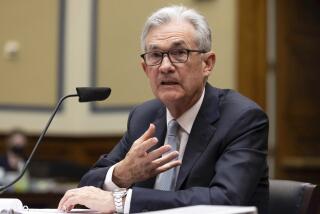Administration Sees ’88 Drop in Deficit
- Share via
WASHINGTON — Despite recent forecasts that next year’s federal budget deficit could rise substantially from the current level of about $155 billion, the Reagan Administration believes the deficit will decline further in 1988 in response to stronger economic growth and additional spending cuts, White House economic adviser Beryl W. Sprinkel said Thursday.
“It is important to continue the trend toward lower deficits,” Sprinkel told a group of reporters. Asked if that would actually happen, Sprinkel replied: “I certainly hope so and believe so.”
The budget deficit for the current fiscal year, which ends on Sept. 30, is expected to end up nearly $60 billion below last year’s record $221-billion deficit. Since a large part of the decline is expected to result from a one-time surge in revenues attributable to the new tax law, many analysts are convinced that the deficit is likely to increase again next year unless Congress and the White House resolve their current impasse over budget policy.
Preliminary Estimate
The Congressional Budget Office, for example, recently issued a preliminary estimate that next year’s deficit would rise about $20 billion from current levels under present spending and tax policies, requiring lawmakers to cut at least that much from the budget simply to prevent the deficit from increasing.
That office has projected a budget deficit $7 billion higher than the Administration’s figure, estimating it will hit $162 billion this year and climb to $182 billion in the next fiscal year. The White House is scheduled to release its own projections for future deficits later this month.
The Administration, generally sticking to its upbeat economic outlook in its latest forecast Thursday, projected lower unemployment than it had estimated in the past but also said interest rates and inflation are likely to be higher than it had expected.
Buoyed by the relatively brisk 3.5% growth rate during the first half of the year, the Administration is sticking with its prediction of continued economic gains through the 1988 election year, projecting overall economic growth, adjusted for inflation, of 3.2% this year and 3.5% next year.
Worries Downplayed
At a White House briefing, Sprinkel, who is chairman of Reagan’s Council of Economic Advisers, downplayed any worries about the economy’s future health, arguing that inflation will settle down later this year and that interest rates will reverse their recent increases.
“Concerns about a continuing reacceleration of inflation are exaggerated,” Sprinkel said, blaming much of the unexpectedly sharp rebound in prices during the first half of 1987 on oil price increases.
Many analysts, however, are skeptical about the White House projection that interest rates and inflation will decline in the years ahead at the same time as the economy continues to plow ahead, reducing the unemployment level to close to 5%.
A Separate Briefing
In a separate briefing for a small group of economics reporters, Sprinkel also suggested that the Federal Reserve might need to ease its monetary policy in the months ahead to avoid any threat of an economic downturn. Until recent months, the Fed had been running a “highly expansive policy,” Sprinkel said, but he is now worried that the central bank may have to move soon to prevent the sharp slowdown in the growth of the money supply from crimping the economy.
The question facing the Fed is: “How far can you move without ultimately interfering with economic growth?” Sprinkel said.
“I’ll be interested in how the Fed views this” in the months ahead, he added, as outgoing Fed Chairman Paul A. Volcker hands over the reins of the central bank next week to Alan S. Greenspan.
More to Read
Get the L.A. Times Politics newsletter
Deeply reported insights into legislation, politics and policy from Sacramento, Washington and beyond. In your inbox twice per week.
You may occasionally receive promotional content from the Los Angeles Times.










